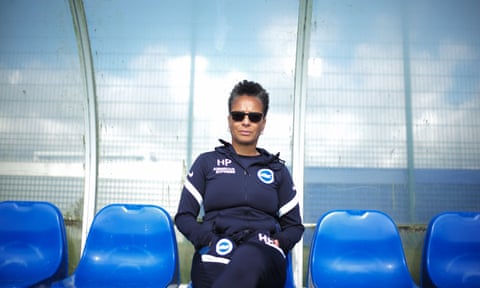When Hope Powell reminisces about the childhood she spent scurrying across the streets of south London, she thinks of football. Perhaps that is no surprise: over the past 40 years, it has given her a career of firsts – after a trophy-laden playing career, she became England’s first female coach, first Black coach and youngest coach. Today, the 54-year-old is the manager of Brighton in the rapidly growing Women’s Super League.
Over the course of Powell’s career, the women’s game has evolved beyond recognition. Her football education began in the late 70s, just a few years after the Football Association lifted its ban on women’s football, in 1971. She idolised Kevin Keegan and Ray Wilkins but had no female players to look up to. She and her brothers would knock on the doors of their friends’ houses, then take to the football cages on her council estate for games of rush goalie to three-a-side.
“I probably did it a little bit too much,” she says, smiling on a video call from her office in Brighton. “Stayed out later than I should have – and quite often got in trouble for that. Didn’t come home after school because I was playing football – got in trouble for that. And I think, being from a West Indian culture, it wasn’t the norm, a girl playing football. It wasn’t something that was seen as what young, Black girls do.”
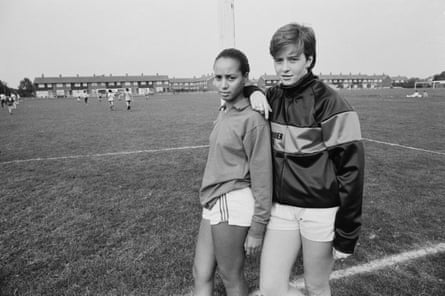
Powell soon understood just how girls playing football were seen. In her early days on the concrete pitches near her home, she was never picked for a team. Later, she competed alongside boys for Abbey Wood school but, after one win, the opposing school complained to the FA. Mixed-gender teams were not allowed, so Powell and Jane Bartley, a future Millwall teammate and Wales international, were banned.
Then there were the endless comments. “When you’re looked at as if girls can’t play – not that they necessarily shouldn’t play, but they can’t play. When I actually got into a team, people were like: ‘What, you play football for a team?’”
Powell was born in Lewisham and grew up in Peckham with her mother, stepfather, elder brother and three stepbrothers. Her birth parents were from Jamaica. When she visited for the first time, at 10, she met cousins, aunts and uncles she had heard of her whole life. Now, she returns whenever she can.
Other areas of her family life, however, were more fraught. In her autobiography, Hope: My Life in Football, Powell says she would witness her stepfather being abusive to her mother; there were times when she would stand in front of her mother when he was angry, in anticipation of further violence. “Some of the experiences I had as a child weren’t great,” she says. “It’s made me stand up. You know, I’m not afraid of anybody. I’m not saying that that’s a good thing. I think that experience has hardened me. It allowed me to fight my corner, say my piece, and that’s what I continue to do.”
In hindsight, Powell’s path to a club environment seems inevitable, but it was fortunate. One day after school, she followed a friend, the only other female footballer she knew, to a training session with Millwall Lionesses. When they arrived, she was stunned. Having grown up surrounded by boys playing football, she had never considered that many other girls also played the sport. She didn’t return home that night until 10.30pm.
“You can only imagine what I went through – I got in quite serious trouble!” she says, laughing. “But I kind of sneaked out and went again. I was picked for the following Sunday based on one training session. And then I never looked back.”
Although her mother was resistant at first, Powell’s development continued seamlessly. In 1983, at just 16, she was called up to the England squad and swiftly made her debut. Even at such a young age, she was unfazed. “I think I was quite arrogantly confident at the age of 11,” she says. “I thought I was good. When I found out there was an England team, I remember saying: ‘Well, I’m going to play for that team.’”
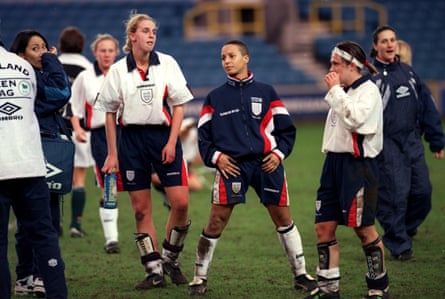
Within a year, Powell was part of the national setup. She was a member of the England squad that reached the final of the inaugural European Competition for Women’s Football (now the European Women’s Championship) in 1984, losing on penalties over two legs to a far more established Sweden team. So underdeveloped was England Women’s programme in those days that the squad would meet up on Friday, play on Sunday and then disband.
Back then, everything about women’s football was different. “It is night and day,” she says. “Now, you treat it as a job, whereas before you had to train on your own, you had to work or go to school and then fit the training in. We used to train on concrete surfaces in schools … We paid subs back then to play. We had to buy our own boots, wash our own kit … It’s a different world.”
Her international and domestic careers flourished. She competed for Millwall, Friends of Fulham (later Fulham), Bromley Borough and Croydon (later Charlton). After winning her first FA Cup title Millwall in 1991, she was made vice-captain of England and played at the 1995 World Cup. The following season, she was a key member of the Croydon squad that won the league and FA Cup double.
Even in her early days, Powell had one eye on the future. She earned her first coaching badge at 17 and, in 2003, was the first woman to be awarded the Uefa pro licence – the game’s highest coaching qualification. “People quite often said: ‘Oh, Hope is coaching to give something back,’” she says. “It was nothing to do with that. I wanted to get paid in the game, I wanted to stay in the game and I thought coaching was a way to do it.”
Yet she never anticipated being catapulted into the most prominent women’s coaching job in the country. Powell was 31 and the vice-captain of England when, in 1998, she was called into the FA’s offices and offered the role of the national team’s manager. At first, she felt confused and doubted herself, but after much deliberation and some tough love from her closest friends, she agreed. Immediately, her mindset transformed.
“When I took the job, the first thing I thought was: ‘I cannot foul this up. I cannot. No. I have to do this well. For myself. For women. For Black people. I have to be the best I can be.’ And I worked really, really hard.” Over the next 15 years, as she took control of so much that happened with the England team, Powell was relentless in her determination to transform it into a professional enterprise.
At times, her fights were as basic as convincing her superiors to provide more footballs. Other challenges included persuading them to start national youth teams, grow her backroom staff and schedule more international matches, in line with the top women’s national teams.
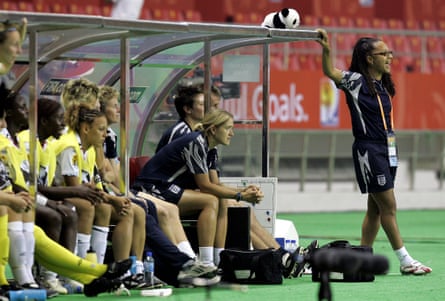
Despite many at the FA being apathetic – at best – towards women’s football, Powell built up a sturdy group of allies, from Paul Barber, now the chief executive of Brighton, to Howard Wilkinson, the former Sheffield Wednesday and Leeds manager who became the FA’s technical director. Her persistence was key. “I was prepared to ask questions and quite often accept the fact that some things would be a ‘no’ and just choose my moments to ask again,” she says. “It was all about trying to make everything better for players, the staff, so that we could move the game forward, because, after all, I was managing a team and we wanted to win.”
Powell says her determination has resulted in her being described as “difficult”, which she has never understood; she says she was simply asking a lot of questions. “Culturally, I was very different, and maybe for some people that was a bit challenging, but that was never gonna deter me from trying to get the best for everybody and get the best for myself. So, yes, I’m sure there were times where people judged me perhaps not on what I was doing, but for other reasons, maybe the colour of my skin, the fact that I was female.”
During her tenure, there were highs on the pitch, including finishing runners-up at Euro 2009 and getting to the World Cup quarter-finals in 2007 and 2011. But there were also disappointments. At Euro 2013, Powell’s final major tournament, England were knocked out in the group stages.
Despite spending 15 years transforming the England setup, Powell was overlooked for other roles within the FA. Today, she is happily in her fifth year of managing Brighton. She remains the only Black manager in the WSL or the Women’s Championship. When her time on the grass is over, she can see herself as a technical director at a club or organisation. “Other than that, it’ll be a nice beach in Jamaica drinking a piña colada,” she says.
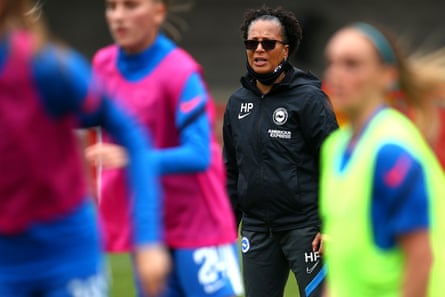
Having helped to professionalise her sport at a national level, Powell is working in the domestic game just as it is making huge bounds. This is the first season of the WSL’s record-breaking TV deal with Sky Sports and the BBC – worth about £8m a season and thought to be the biggest broadcasting package in women’s football – and investment is only growing. “Over the last 10 years, massive strides have been made in the women’s game,” says Powell. “I think we need to continue to professionalise and make sure there is parity across the board.”
So far, women’s football has avoided the worst of the racism that plagues the men’s game. “There have been some incidents of racism, but nowhere near the scale of what is in the men’s game, not even close. Hopefully, we keep it out.” Does she think things are improving? “In the men’s game – listen, me and my partner were at the Euros final. We knew that was what the next day was going to bring based on the penalty shootout. So that in itself tells you: no, we haven’t moved on. We haven’t moved forward.”
Taking the knee remains an important symbol to her, but she thinks there must also be clear action alongside it. “I take the knee because I want it to be on the radar. I think people should keep talking about it until it’s eradicated. And how would you do that? Zero tolerance. What does that mean? Don’t let fans in the stadium. That’s it. The money that’s generated from people supporting the game is huge, isn’t it? If associations can’t [control them], just don’t let them in.”
As the interview winds down and Powell prepares to reckon with her second of three games in six days, I ask: what has been the most satisfying moment of her career? She pauses, eventually settling on the experience of managing the Great Britain team at the Olympics in 2012. Initially, she had not wanted the job – her peers could not understand her hesitation – but she loved every moment. And then there was the sweet satisfaction of returning England to the World Cup in 2007.
“I think I’ve worked hard, make no mistake, but I’ve been very blessed to work with some fantastic people. I’ve had a lot of pleasure points that I’ll take with me for ever.”
